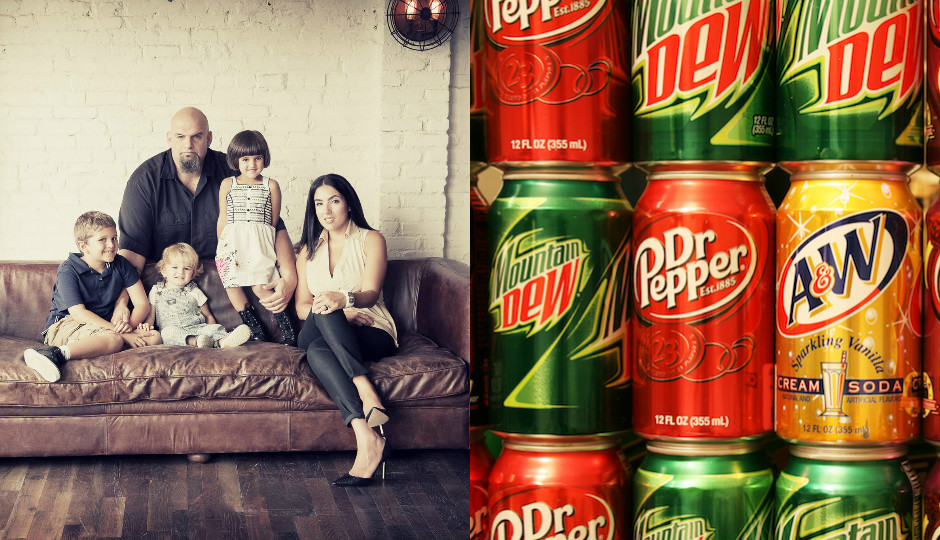Fetterman: Stop Calling the Soda Tax “Regressive” — It’s Actually Progressive

John Fetterman, his wife Gisele, and their three children. | Photo via John Fetterman’s Facebook
(Editor’s note: This is an opinion column from guest writers John and Gisele Fetterman. John is the mayor of Braddock, Pa., and a former candidate for Senate. Gisele is a nutrition activist and founder of 412 Food Rescue.)
The term “regressive” is being thrown around a lot in Philadelphia’s soda tax debate. It really shouldn’t be. You see, regressive policies are those that hurt the poor and make the steep climb out of poverty all the more difficult. The soda tax is just the opposite. By funding universal pre-K, it will help eliminate educational disparities and provide a pathway out of poverty for thousands of children.
This issue is personal for us. One of us grew up in an immigrant family struggling to escape poverty, and the other is mayor of Braddock, Pennsylvania, which has been mired in it for decades. We’ve devoted most of our adult lives to fighting inequality and believe that every child deserves to start out with a basic equal footing in life.
Frankly, anyone who would label the soda tax regressive doesn’t understand poverty, and has likely never had to overcome those kinds of policies personally. The only logical explanation for how the soda tax came to be labeled “regressive” is that it was pushed by the powerful soda industry. While that label provides convenient cover for elected officials who would rather not vote against the billion-dollar industry, it fails even the most basic test of accuracy. It’s true that low-income individuals currently drink more soda than higher income individuals. But will they continue to buy it at the same rate if the price goes up due to a soda tax? No.
You don’t have to have a Ph.D. to understand that if the price of a non-essential product goes up, those with limited income are most likely to avoid it. The soda tax can’t be a tax on the poor if the poor aren’t buying soda. That basic logic is substantiated by research completed at the University of North Carolina on Mexico’s soda tax, which found that rates of soda consumption declined fastest among low-income individuals after the tax was imposed.
So the impact of a soda tax on the poor isn’t so simple. But what is clear is the overwhelmingly positive impact of what the soda tax would fund: universal pre-k, community schools, improved parks, rec centers and libraries — programs that are proven to help children and families break the cycle of generational poverty.
We don’t like to admit it in this country, but a child’s opportunities in life are largely determined by the family he or she was born into. That has to change. This shouldn’t be a matter of ideology: Every child deserves to start out on a basic equal footing in terms of how they transition to the rest of their academic life. The only reason quality pre-K isn’t in every urban center in America is because quality costs money. And with Pennsylvania’s uniformity clause, the soda tax is one of the few ways to raise the necessary revenue. There’s nothing regressive about that.
What would be regressive is if the city of Philadelphia taxed a product that low-income individuals couldn’t avoid buying. The container tax, which was proposed as an alternative to the soda tax by — surprise — millionaire soda distributor Harold Honickman, would increase the price of water and health supplements. Does increasing the price of these necessities eat up a greater percentage of their income than for middle-income or affluent Philadelphians? You bet.
A container tax would also sacrifice all the potential health benefits of a soda tax. One Harvard study found that instituting a soda tax in Philadelphia would save $197 million in health care costs, lead to 36,000 fewer cases of obesity, result in 2,280 fewer cases of diabetes each year, and prevent 730 deaths by 2025. Under a container tax, not only would these health benefits disappear, but the consumption of sugary drinks may actually increase as the beverage industry could reduce its tax liability by marketing larger bottles.
No matter how you look at it, the soda tax is the right choice for Philadelphia. It funds essential anti-poverty programs without forcing a single low-income individual to pay it, while encouraging a healthier diet for everyone. That’s why hearing the soda industry and their allies attack the soda tax out of a supposed concern for the poor seems more than a little disingenuous. They are trying to cloud the issue and make the debate about taxes. It’s not. This is about making kids healthier and giving every child a legitimate chance to learn and succeed.